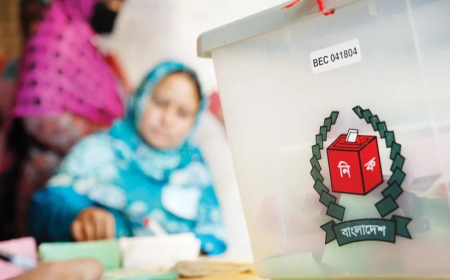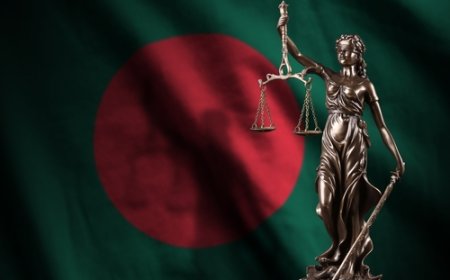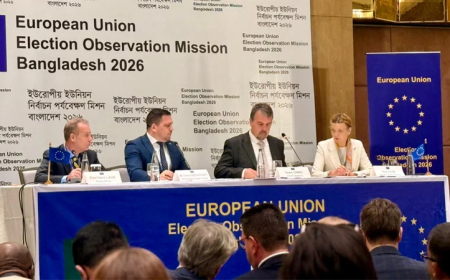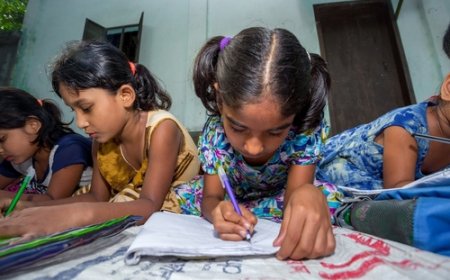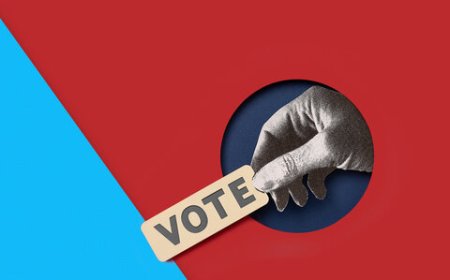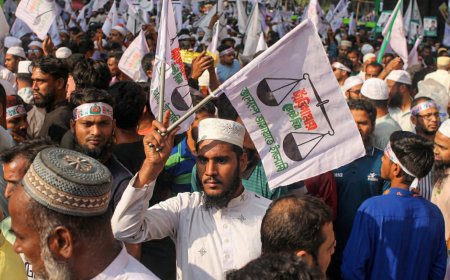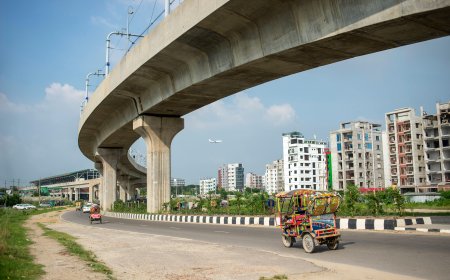The Political Storms That Await BNP
BNP is almost certainly coming to power sooner rather than later. But that may just be the beginning of its real problems.
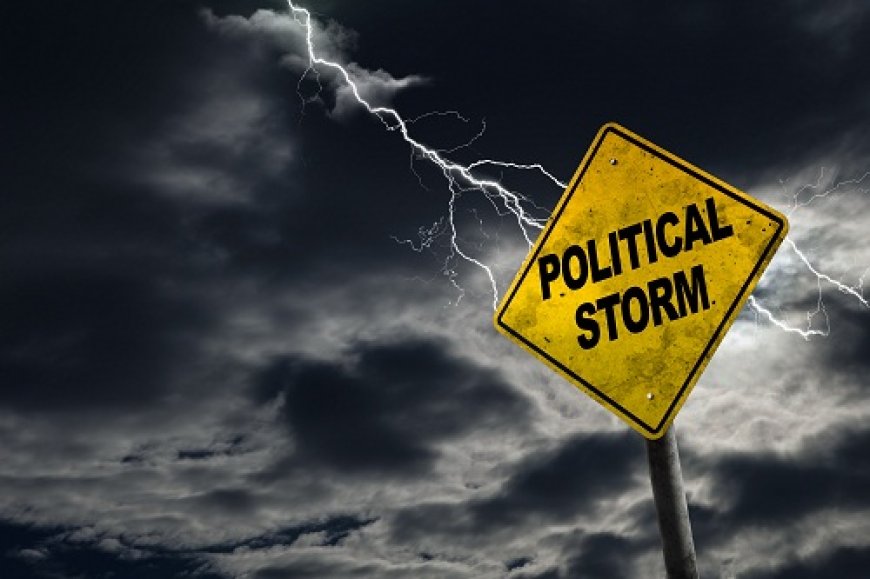
At present, many people believe that the BNP will constitute the government with an absolute majority in the upcoming election and govern the country.
This thought may evoke a sense of excitement among BNP leaders and activists while unsettling the opposition. However, the political path ahead is unlikely to be so straightforward for the party.
Even the hope that the BNP will come to power through a fair and peaceful election doesn’t appear to be easily achievable. Considering this context, let’s examine the potential future political storms that await BNP.
Popularity Paradox
Paradoxical as it may sound, one of the main problem facing BNP at present is its popularity.
In the absence of the AL, the BNP appears to be the biggest party in the country. That very popularity is enough to create tremendous pressure on the BNP. As the leading party, public expectations from the BNP have increased dramatically.
This can be explained following Ernesto Laclau's concept of "populist demand." BNP is now turning into an "empty signifier," a symbol onto which diverse and often conflicting expectations are projected. Its political opponents are strategically weaponizing this burden of expectation against the BNP. This is a well-used tactic not uncommon in politics of Bangladesh.
As a result, any misdeed by any BNP activist is being imposed on the party as a whole. BNP has expelled more than 4,000 leaders and activists over the past nine months for breaching party discipline. We don’t really know what measures other parties have taken against their own members who have violated party rules. Neither we know how many have faced action for their indiscipline.
However, BNP's opponents have been able to strongly establish this perception that all the injustice and wrongdoing in the country are the fault of BNP activists. There is little doubt that many BNP activists are involved in wrongdoing, but it seems the politics around it is louder than bringing them under justice.
Ticket To Ride
Meanwhile, BNP’s second potential problem is that the party itself is not sure which of its leaders really have public support. Sounds surprising, right? Let’s think about it this way. BNP couldn’t test its leaders’ strength in the last three rigged elections. As a result, just as AL has produced hybrid leaders who bought parliament tickets to become MPs, BNP, too, couldn’t assess how much public support its leaders have. The only acceptable way to know this is through elections.
This led to the formation of leadership factions at all levels of BNP where everyone believes they have public support, but there is no data to prove or disprove it. These internal power factions pressure central leadership to implement their agenda. Meanwhile, the central leadership cannot decide based on which leader has how much support because that information doesn't exist.
This limitation forced central leadership to rely on personal loyalty. This process weakens the party and increases the tendency of constitutional breakdown and power competition.
The reality is that if a national election doesn’t take place, this tendency will grow, and the BNP will ultimately be harmed. The party’s opponents understand this very well. That means this weakness will be used politically by BNP’s rivals -- that’s only normal. In other words, the attempt to delay elections again and again.
Reform Realism
BNP’s third major problem is its realistic position on reform proposals. To explain this, one must understand Machiavellian political realism. Since the BNP is likely to come to power, it will bear the responsibility of implementing reforms.
On the other hand, BNP's opponents, which agree on almost all reform agendas, with some minor exceptions, are not coming to power right now and have nothing to lose. If all the reforms are implemented, they will enjoy a strong position as opposition, but won’t have to take the blame for governance failure -- that blame will fall on the BNP government.
BNP is also concerned that some reform proposals are framed in a way that would make the next elected government weak from the start, for instance, the proposal to establish the National Constitutional Council (NCC). However, here lies the politics. Now, if the BNP vetoes many reform proposals and pushes for elections, then other parties like Jamaat, NCP, AB Party and other Islamist blocs may boycott the elections.
Moreover, they can threaten to resist the election as well. In such a scenario, BNP will be left with no option. The current indications are that AL won’t be allowed to contest. Now, if Islamists boycott, will the BNP contest the election alone? If those same parties try to resist the election, will the government use force to conduct it? I don’t think so.
This is the worst-case scenario. I'm not saying this will definitely happen, but we are seeing many such signs in politics. The point is that the opposition has tools for blackmail, but the BNP doesn’t. That’s the reality. That’s why the BNP has to make more compromises than anyone else. We need to examine this not from a populist perspective but from a purely political analysis point of view.
No Muscle Memory
Another problem for the BNP is that it has had no governing memory since 2006. When any political party forms a government, it gains experience from running the country, and a "governing memory" is created within the party. This helps form a skilled group inside the party, which is essential for governance.
But since 2006, for nearly 19 years, BNP has developed no such memory, while the governance reality of the country has changed. In this new context, any structurally weak government that the BNP might form would likely face serious challenges. If all constitutional reform proposals are accepted now, undoubtedly, we will have a weak government in the future, constantly obstructed by the opposition. In our politics, the government bears the blame for every failure, while the opposition has no such responsibility. This is why it’s easier to be in the opposition in our political system.
Days of Rage
Another storm potentially facing BNP is the "angry youth." Many of us are turning a blind eye, but the reality is that angry youths are all around us. They don’t get what they want, and what they get, they don’t want. This gap between expectation and reality has created outrage among them, which played a central role during the July movement.
That “feeling of outrage” remains and will likely grow further because while the mentality to take responsibility has not increased, our expectations have. This expectation is the biggest risk to BNP’s governing future.
When the BNP comes to power, it will have to face the strong online presence of Jamaat and NCP, the street power of Islamists, and the international pressure from AL allies.
How the BNP handles this three-pronged pressure will determine its future. The reality is, in governance, the BNP won’t get support from its former allies, who are now opposition forces, because BNP will primarily have to counter the rise of political Islam.
The question is, will BNP be able to do that?
How the BNP handles these five storm clouds will determine much of its political future. If the BNP wants to govern with a public mandate for the next 10 years, then it has no alternative but to modernize the party.
On the other hand, there are some crises that the BNP can’t do much about except to be patient, like if the opposition boycotts the election. Honestly, there is no easy solution to these crises. So, we can say without doubt that BNP’s political future will not be easy.
The question is: how prepared is the party?
Asif Bin Ali is a doctoral fellow at Georgia State University, and he can be reached at: [email protected].
What's Your Reaction?







